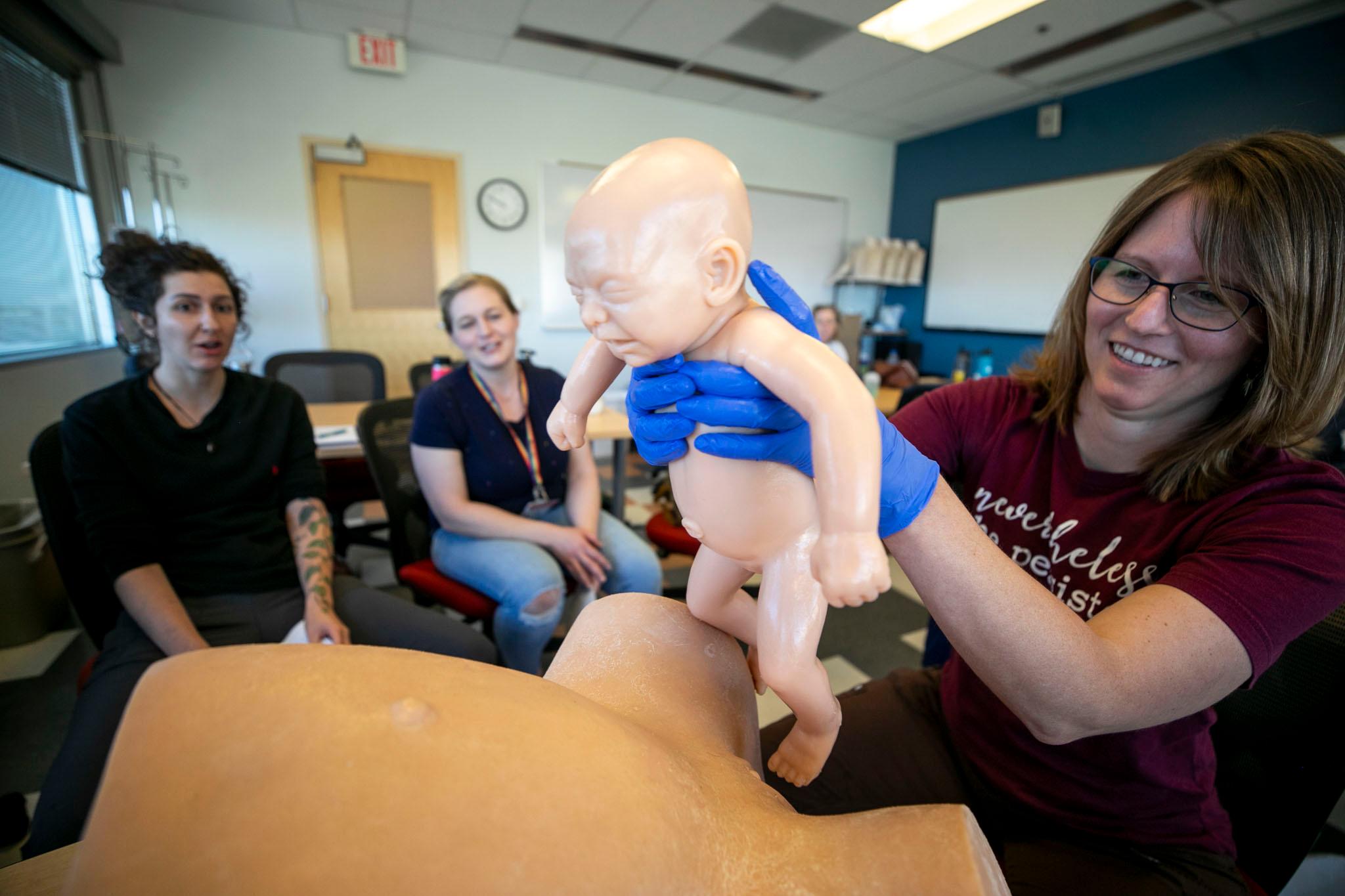A big, fake pregnant belly is the center of attention for a group of nurse-midwifery students at University of Colorado Anschutz.
Standing behind the hollow stomach, an instructor pushed a fake baby out the birth canal, mimicking childbirth. Earlier this month, the students took turns coaching the plastic torso on how to push, applying abdominal pressure and catching the very slimy, very fake baby that came out the other side.
Next door is a mock hospital room. Students practiced labor and delivery skills on a full-sized mannequin that birthed fake infants while an instructor sat in a command center, calling out vital signs and observing as students learned how to deliver babies.
These patients might be fake, but the skills these students are studying are in the name of a real, and growing, issue.
More than half of America’s rural hospitals do not offer labor and delivery services, according to data from the Center for Healthcare Quality and Payment Reform.
It’s a problem that is only getting worse. Rural hospitals are struggling financially, and abortion bans in some states are pushing providers out of state.
Abortion is legal in Colorado, but still, 52 percent of the state’s 42 rural hospitals lack labor and delivery services. The median drive time to a hospital that does offer that kind of care is 46 minutes.
With those maternity deserts can come higher infant mortality rates and more premature births for families in rural areas.
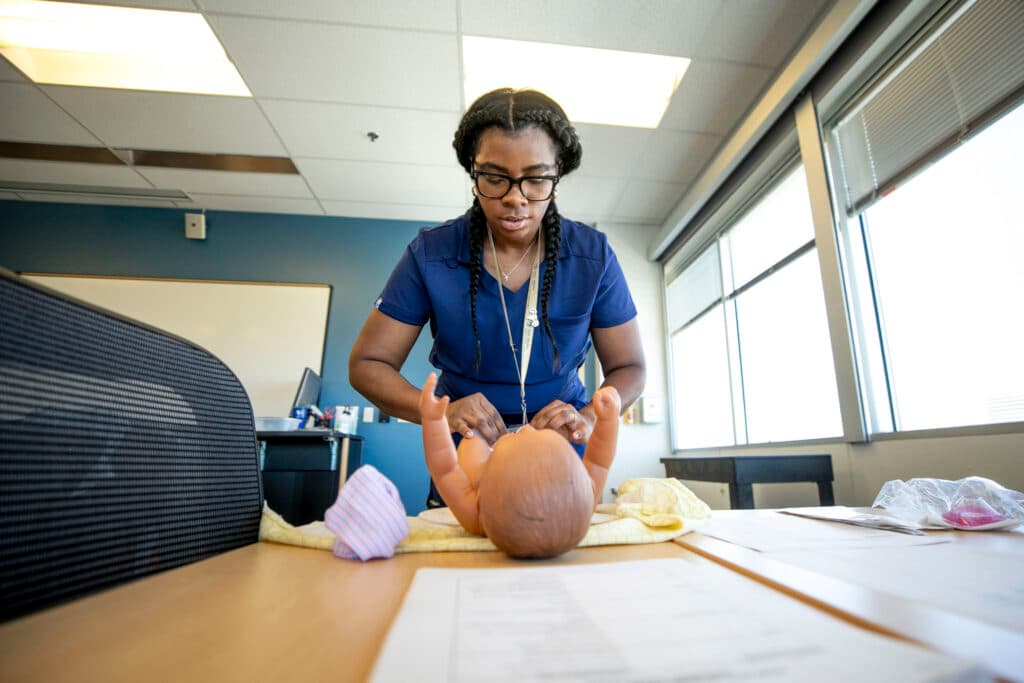
Enter the nurse-midwife.
In the U.S., many midwives are fully trained nurses with master’s degrees specializing in holistic maternal health care, ranging from pre-conception to pregnancy and childbirth.
Recent studies have shown that involving midwives in care can improve maternal health outcomes. And with the ability to take the lead in labor and delivery with low-risk pregnancies, some health care advocates see nurse midwives as a potential solution to the country’s maternal healthcare crisis.
That’s why University of Colorado’s College of Nursing has started a program aimed at students who plan to work as midwives in rural communities.
Funded through a $2 million federal grant, the school provides full tuition and a living stipend for students in the nurse-midwifery master’s program who pledge to spend two years working in a rural area after graduation.
The first five students started the rural track at CU’s Aurora campus earlier this year.
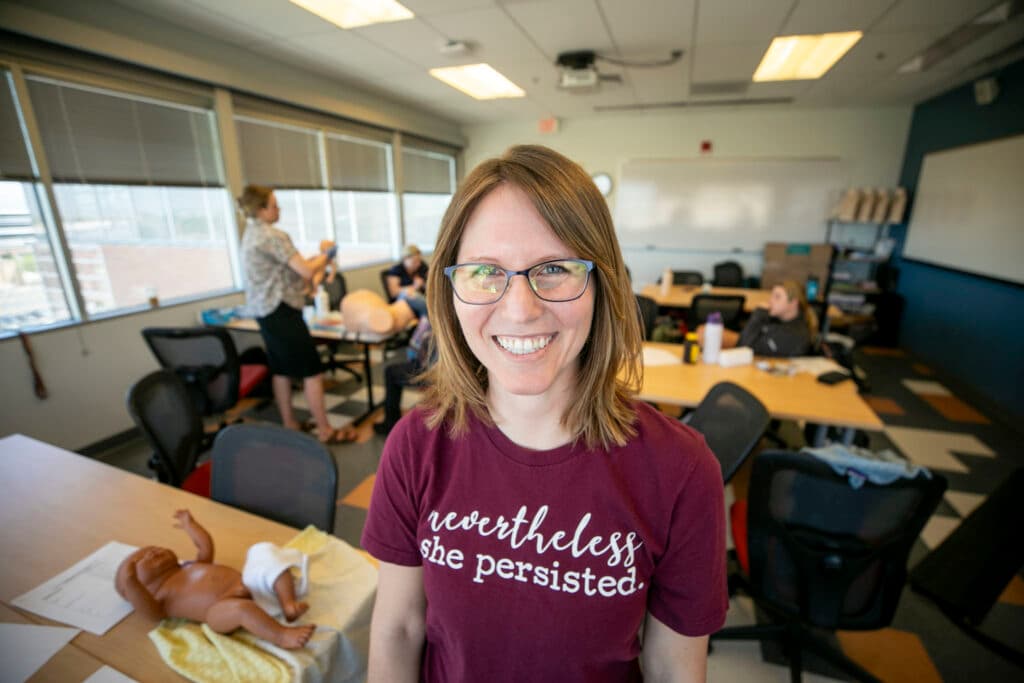
One of those students, Tessa Huizenga, grew up driving hours for health care from her hometown in Lusk, Wyoming.
Lusk has a population of about 1,400 people. The nearest major hospital is a two-hour drive. For serious care, emergency personnel airlift patients to Rapid City, South Dakota, or sometimes even to Denver.
When Huizenga was born, her mother drove two hours for prenatal care.
“There's a lot of people that just don't understand what access to care can look like,” Huizenga said. “[When I had] my wrist surgery, I had to have specifically a wrist specialist for therapy and everything, and I couldn't just go to the therapist there in town. I had to drive an hour multiple times a week just to go to therapy.”
That’s why Huizenga wants to work as a midwife in rural communities.
She attended undergrad at University of Wyoming, and then worked as a nurse in pediatrics for a few years before enrolling to get her master’s in midwifery at University of Colorado.
Huizenga has always been interested in labor and delivery, but she said she’s drawn to midwifery specifically because of the unique role midwives play as health care providers during pregnancy.
“I like the midwifery model of care a lot better. Pregnancy and birth is just a normal thing. It's not like a diagnosis or something that we have to fix, that's pathology, it's just a completely normal process,” she said. “There's a lot of continuity of care, you get to work with not only the birthing person but their entire family to help improve their lives, at that point in time and later on, as they grow and have their kids and their families and everything.”
On top of the free tuition, Huizenga also gets specific classes focused on working with patients in a rural setting and clinicals in places like Alamosa, Montrose and Glenwood Springs as part of the rural track.
“To have that flexibility that I can go to a rural setting where realistically, I probably won't get paid as much, and not have to worry about having debt hanging over my head, that makes a big difference,” she said.
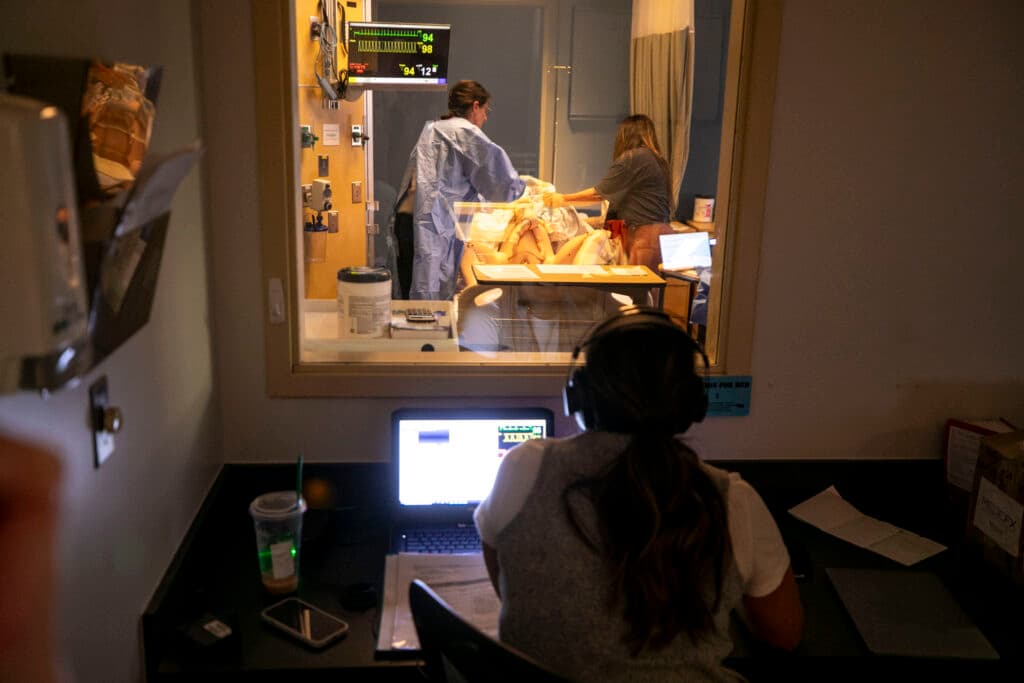
San Luis Valley is one part of the state that faces challenges with maternal health care.
Stephanie Posorske works as a midwife at San Luis Valley Health in Alamosa, one of the medical centers partnering with CU.
Posorske lives on her family’s cattle ranch where she grew up, located about twenty minutes from the medical center. She wanted to deliver babies ever since she was a kid, helping her father pull calves out of cattle when they gave birth.
Posorske is proud of the work she and her fellow staff do in bringing labor and delivery services to south-central Colorado. But she also faces unique challenges as a rural healthcare provider.
“The specialists of OB [obstetrics and gynecology] care are three hours away,” she said. ”So if I have a patient that needs to be somewhere that has a NICU [neonatal intensive care unit] or does high risk, they’re getting on a helicopter, and that’s expensive, and it's a hard choice at times.”
One day during the pandemic, the health center came close to sending every pregnant person in childbirth, even low-risk patients, on a helicopter to other hospitals because all the available labor and delivery nurses had COVID. They were only able to stay open because one midwife, who was supposed to be off that day, came in and took the lead on delivery.
Posorske herself traveled to Colorado Springs to give birth to her most recent baby. She wanted to have a vaginal delivery after a previous cesarean section, a situation that can run the risk of rupturing the surgical scar on the uterus.
If that were to happen, an on-call surgeon needs to be five minutes away, not twenty minutes away like in some rural areas.
“We just don't have the access to things,” Posorske said.
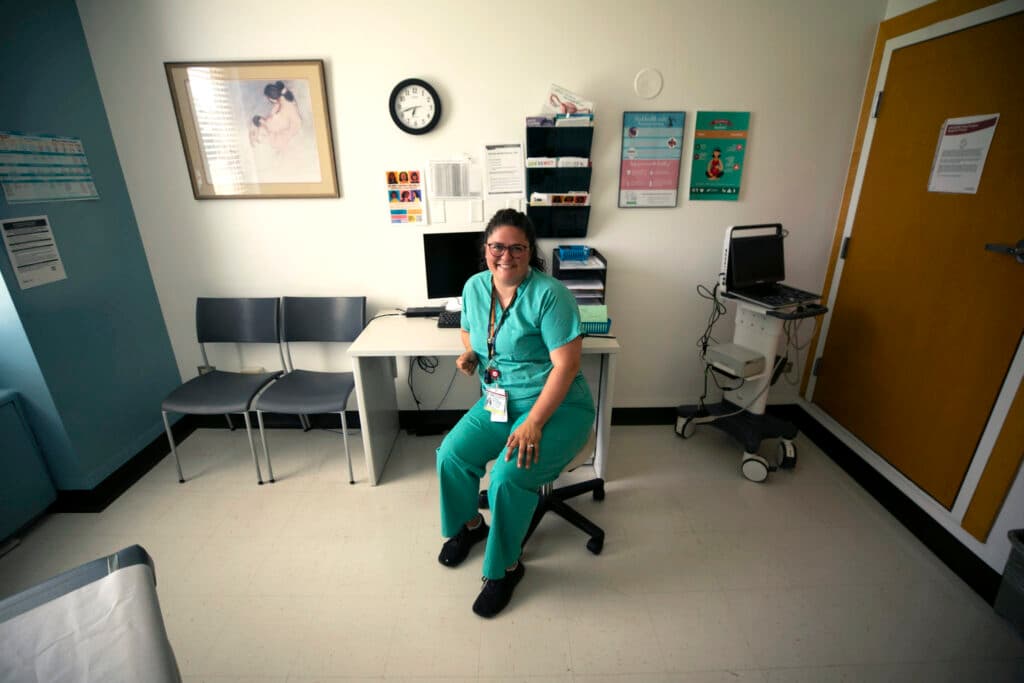
Students in CU's program get extra training aimed at building up specific skills to work in rural communities.
Shannon Pirrie, director of the nurse-midwifery program, works with fellow faculty at the campus in Aurora to build out the curriculum.
Students get additional training on things like caring for patients with substance abuse disorder who might not be able to access other resources nearby.
They also get help building a network of midwives in surrounding clinics and hospitals they can go to for support. Unlike in city hospitals, a peer midwife is not always right down the hall to give support or advice on care.
Pirrie worked as a nurse-midwife for nine years before taking over the graduate program in 2020. She grew up in Loveland and comes from a family of nurses, including great-grandmothers who were midwives in Europe decades ago.
In addition to teaching, Pirrie works as a midwife at a clinic in Sheridan that largely serves patients on Medicaid and those without insurance. Sometimes she helps patients with more complicated pregnancies who drive hours to Denver to get more complex care.
Recently, Pirrie saw someone who came from a rural town with an issue with her placenta. The condition ended up improving — but had it not, the patient may have needed to relocate to Denver for the rest of her pregnancy, or risk an airlift from a rural hospital to the city if complications continued.
“I think we got into this because our country doesn't value women's health as much as they should, and the prioritization is tough in rural communities,” Pirrie said. “It is not that people in those counties don't care about helping their patients. It's that there's no access, there's few people doing it, the awareness and education is missing, it's like a whole system effort that needs to shift.”
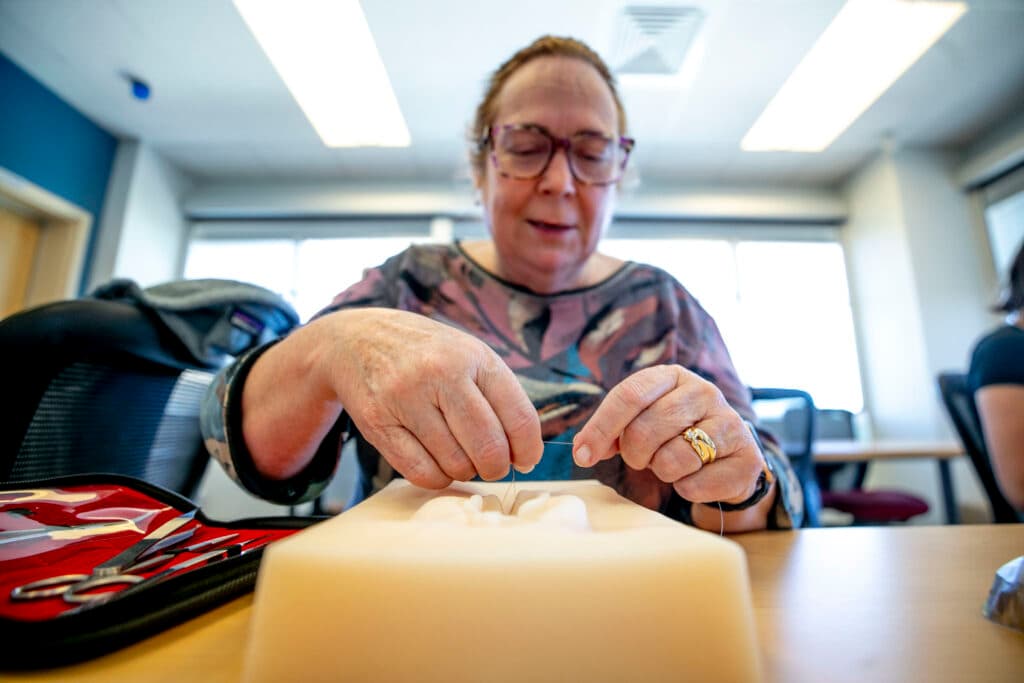
Increased restrictions on abortion in other states have impacted reproductive health care in Colorado.
Recently, some of the patients traveling hours to Denver are coming not just from rural Colorado but also from states that have banned abortions, Pirrie said.
“They get here a lot later than they should have,” she said.
Pirrie feels lucky that in Colorado, she can fully teach her curriculum without worrying about restrictive abortion laws. But she said that nurse-midwifery programs in other states have had to change portions of their programs or even avoid talking explicitly about abortions entirely.
“It's terrifying,” she said. “This decision doesn't stop abortions, it just stops you from getting safe abortions and timely abortions and more affordable abortions.”
While Pirrie and other faculty can fully teach their program, there are students, especially those on the rural track, who might end up working in states with abortion bans. It’s something Huizenga thinks about when deciding where to work after graduation.
“It's very concerning because there's a lot of politics that go along with it, and in the midst of all of that, while the politicians are fighting about it and everything else, you have women and families that are suffering because they can't get the care that they need,” she said. “There's a lot of states because of how restrictive they are that I don't want to go to.”
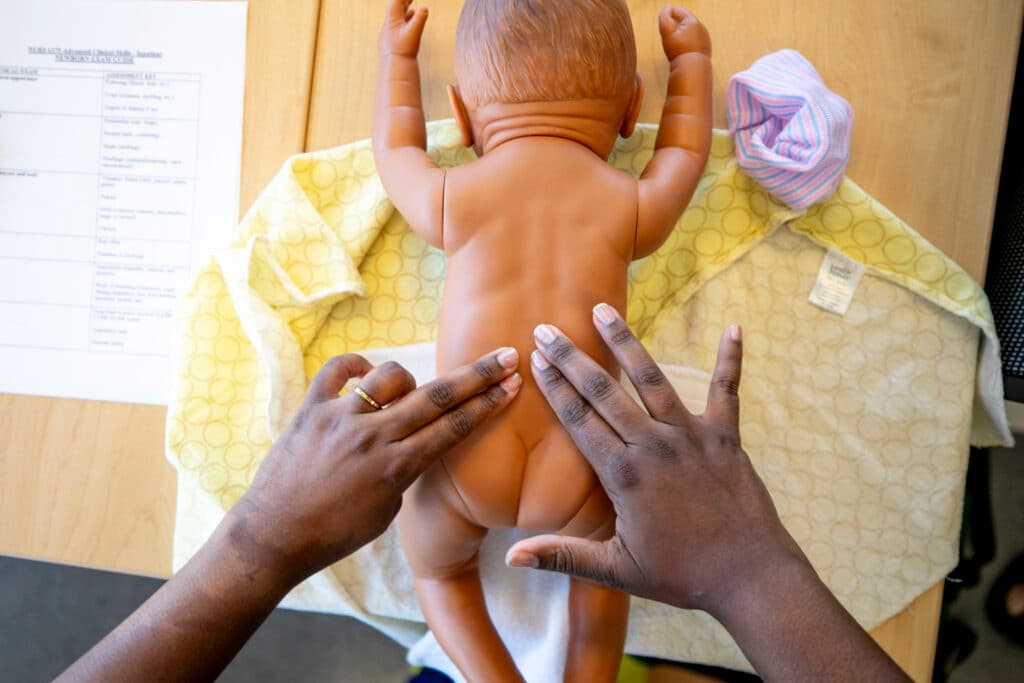
Funding for the rural program lasts four years, but Pirrie hopes the track will become a permanent part of the nursing school’s curriculum.
Grant recipients, including CU, have the option to apply for an extension for four additional years, something Pirrie plans to do to keep the scholarships coming.
But she also plans to expand the track to non-scholarship students given the volume of interest in the program. Students apply for the track once enrolled in CU’s nurse-midwifery program as an add-on to the main curriculum.
Some of the students, like Huizenga, apply because they come from rural communities themselves.
But Pirrie said she was surprised to see a number of applicants who come from cities and want to work in rural communities after treating patients who drove hours for care at bigger hospitals.
As for Huizenga, she’s not exactly sure where she wants to live after graduation in December. She is spending part of the summer training in Glenwood Springs, and plans to get a doctorate at CU after she finishes her master’s in nurse-midwifery.
Ultimately, she said she could see herself back in Wyoming, South Dakota or maybe elsewhere in Colorado.
“I definitely want a smaller town, I like that way of life, it's just so much more casual and slow paced,” she said. “I don't have to deal with traffic which is amazing.”
She said one thing is for sure: Denver is too big.
Correction: The captions in this story originally incorrectly named CU's College of Nursing; that has been fixed.

